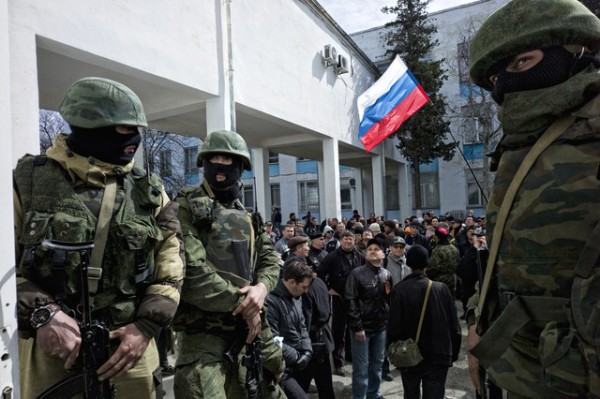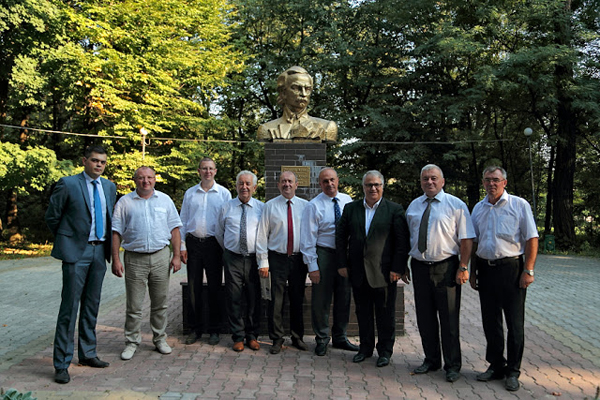The Russian Federation, an emerging state with a varied living standard, some of its regions corresponding to the third world, but an overall influential state in the global system, is a power even compared to the United States and holds many instruments for international control through which the self-titled „Third Rome” propagates its power. In the present paper we will try to identify Russia’s external „military chain” which comprises foreign military bases on a transversal axis North-West – South-East, by which Kremlin ensures its permanent presence in the Eurasian space.

The international relations system is a highly complex one and if we guide ourselves by the neo-realist principles, we have a multi-system operating, in simple translation, after the rule „the strongest survives”. At least, this is the reality shown by the events which happened in the past few years: the Syrian crisis, the annexation of Crimea, the Ukrainian hybrid war, the rise of the Islamic state, the disappearance of old borders, failed negotiations (particularly in terms of ceasefire in eastern Ukraine, during the Minsk summit) and further on. At the beginning of the XXI century, diplomacy has apparently failed in certain geographic areas, as proof standing the continuous fire exchanges that mark an increasing number in human costs.
Seeking to keep our neutrality concerning the ones responsible for the security paradigm change and practically the start of a „new Cold War”, is difficult yet not to see, at least at European level, the changing of Russian tactics which in the long term can turn into effective strategy threatening the security of the Euro-Atlantic community. Beyond the economic means used by Moscow in energy blackmail, carried against the entire Europe, there are methods of direct threat as well, military ones, both within Russia (strengthening the national army) as well as consolidating the external military bases: Kaliningrad, Transnistria, Crimea and Tartus .
Kaliningrad is a Russian enclave situated between Lithuania and Poland, therefore the military and geostrategic potential of this region confers Moscow the defensive capacity (according to Russia, but offensive if we look at it from another angle) to send a message to Western powers meaning that Russia is a military presence in Europe and furthermore represents a bastion of power that follows its own rules, different from those of the European Union and of democracy on the whole. Along with the escalation of Ukraine’s conflict, Moscow has strengthened the military capabilities of Kaliningrad[1], at the expense of Lithuania’s, Latvia’s, Estonia’s and why not even Germany’s safety.
Following the transverse axis direction towards South-East we see that Transnistria, part of the Republic of Moldova, is another important Russian pillar on whose territory a contingent of Russian „peacekeeping” forces might stand (a battalion of about 412 persons) as well as the military unit N13962 (or Operative Group of Russian Troops – OGRF), composed of two battalions of about 1,000 people[2]. Transnistria is a region controlled in an offensive manner by the Russian Federation and together with the Crimean peninsula represents the control point of Moscow in the Black Sea. Through this control, Russia has influence on both the commercial traffic conducted in the Pontic Basin and also on the energy routes transiting the Black Sea (hence the construction of the new Turkish Stream project, a Russian initiative in partnership with the Ankara government).
Moving toward the South, not far from Israel, is the Tartus port, area with great geostrategic potential which confers Russia the ability to expand its influence in the Middle East, targeting the oil traffic, but also upon the Mediterranean trade[3]. Through this corridor, from North, from the Black Sea – to South, at the Tartus port in the Mediterranean, Russia is consolidating a route extremely important concerning both legal trafficking as well as illicit arms trade towards conflict areas in North Africa (Egypt, Libya)[4].
It is well known that Russia is a country whose policies are „designed” to make the state withstand both the internal pressures (through the oppressive state apparatus) and the external ones. Things would significantly simplify if Moscow’s actions were not in opposition to those of Brussels and, why not, to those of Washington, but unfortunately the recent events have shown us that we do not live in a paradigm of idealism.
As a conclusion, it should be noted that the „military axis” above mentioned is merely one of Russia’s „hard power” means through which it spreads its power internationally. Apart from these tools, Kremlin acts through well known „soft” instruments as well, like propaganda (visible including in the press from Chisinau) or „charity” initiatives for the institutional state entities and states that are in financial collapse (see the case of Greece[5]).
Autor: Radu Pătrașcu, pentru InfoPrut
Bibliography
- Kaliningrad, Moscow’s Military Trump Card, article published by Radio Free Europe on August 29th, 2015, link: http://www.rferl.org/content/kaliningrad-russia-nato-west-strategic/27079655.html, accessed on August 29th, 2015;
- Trupe ruse de recunoaștere au desfășurat exerciții în Transnistria, article published by AGERPRES on June 5th, 2015, link : http://www.agerpres.ro/externe/2015/06/05/trupe-ruse-de-recunoastere-au-desfasurat-exercitii-in-transnistria-11-53-10, accessed on August 29th, 2015;
- Haidar, Ziad, Syria keen on Russian expansion in Middle East, article published by Al Monitor on March 31st, 2015, link: http://www.al-monitor.com/pulse/security/2015/03/syria-russia-tartus-base-intervention-expansion.html, accessed on August 29th, 2015;
- Aman, Ayah, Egypt acts as middleman for Russia-Libya arms deal, article published by Al Monitor on February 29th, 2015, link: http://www.al-monitor.com/pulse/originals/2015/02/egypt-efforts-libya-army-russia-weapons.html, article accessed on August 29th, 2015;
- Martin, Daniel, Now Greece may turn to Russia for a bailout: Kremlin set to offer discounts on natural gas supplies in exchange for some of Athens’ assets, article published by Daily Mail on April 8th, 2015, link: http://www.dailymail.co.uk/news/article-3029532/Now-Greece-turn-Russia-bailout-Kremlin-set-offer-discounts-natural-gas-supplies-exchange-Athens-assets.html, accessed on August 29th, 2015.
[1] Kaliningrad, Moscow’s Military Trump Card, article published by Radio Free Europe on August 29th, 2015, link: http://www.rferl.org/content/kaliningrad-russia-nato-west-strategic/27079655.html, accessed on August 29th, 2015
[2] Trupe ruse de recunoaștere au desfășurat exerciții în Transnistria, article published by AGERPRES on June 5th, 2015, link : http://www.agerpres.ro/externe/2015/06/05/trupe-ruse-de-recunoastere-au-desfasurat-exercitii-in-transnistria-11-53-10, accessed on August 29th, 2015
[3] Ziad, Haidar, Syria keen on Russian expansion in Middle East, article published by Al Monitor on March 31st, 2015, link: http://www.al-monitor.com/pulse/security/2015/03/syria-russia-tartus-base-intervention-expansion.html, accessed on August 29th, 2015
[4] Ayah, Aman, Egypt acts as middleman for Russia-Libya arms deal, article published by Al Monitor on February 29th, 2015, link: http://www.al-monitor.com/pulse/originals/2015/02/egypt-efforts-libya-army-russia-weapons.html, article accessed on August 29th, 2015
[5] Daniel, Martin, Now Greece may turn to Russia for a bailout: Kremlin set to offer discounts on natural gas supplies in exchange for some of Athens’ assets, article published by Daily Mail on April 8th, 2015, link: http://www.dailymail.co.uk/news/article-3029532/Now-Greece-turn-Russia-bailout-Kremlin-set-offer-discounts-natural-gas-supplies-exchange-Athens-assets.html, accessed on August 29th, 2015

